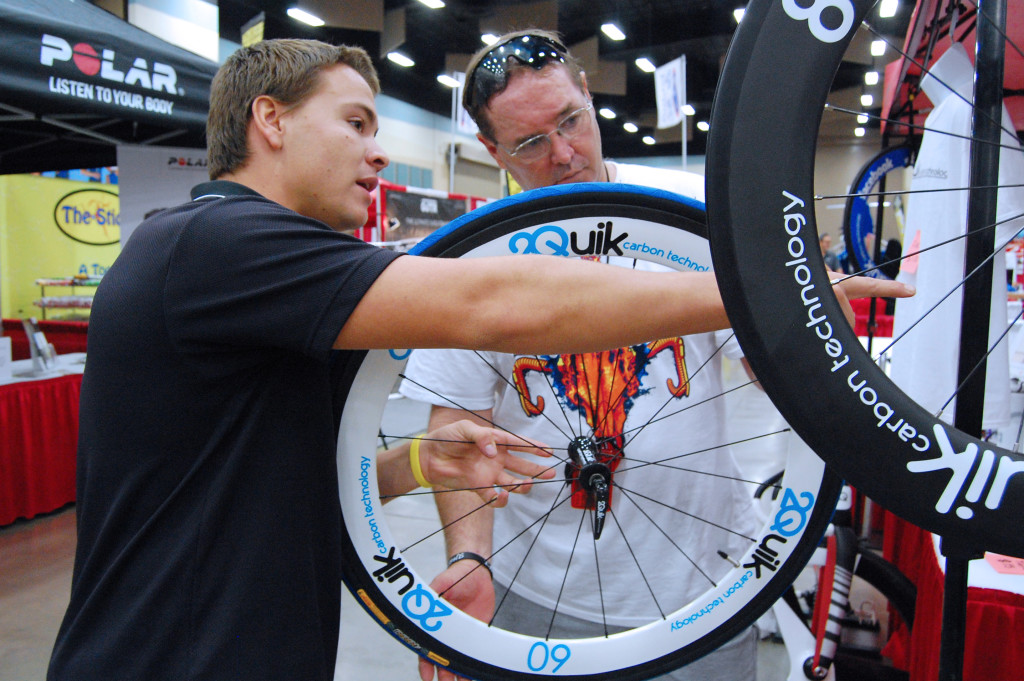
Team cyclists did more than just rack up the medals during this year’s Hotter ‘N Hell Hundred.
One team member is making a name for himself in the small business world by providing imported carbon wheels to both the cycling team and the community at large.
Anthony Sequera, 21, junior in business management, started his business, 2Quik Carbon Technology, when he was 19. After only two years, his company is an official sponsor of the cycling team and he has sold hundreds of carbon wheels to riders worldwide.
“I began cycling and was racing, and I wanted a nice set of carbon wheels,” he said. “You see all the pros racing with them, and you see all the really fast guys racing with them, but those wheels cost $2,000 to $3,000. I knew that I could find somewhere where they were making them overseas for really cheap and good quality.”
MSU bikers use Sequera’s wheels
Among the cycling team, five riders use Sequera’s carbon wheels.
Sam Croft, a freshman in geoscience on the cycling team, said the whole team got the option to race on his wheels, which retail for about $1,000, during the collegiate road season, and they chose to.
“Being an international student, I didn’t bring my own wheels,” he said, “so I slightly got priority. He gave them to me for free all season.”
Croft said all riders have their own preferences when it comes to the style of wheels they choose, but Suquera’s ability to provide wheels to cater to each rider’s taste is what made him unique.
“All wheels have different characteristics,” Croft said. “He has different variety like sizing. I tried his 40s (millimeter) but moved up to 60s.”
Sequera also makes wheels available to each type of terrain on which the cycling team trains and competes.
“He’s got wheels for both road and track,” Croft said. “If we want to request something, he does whatever he can to get us what we need.”
Cycling team member Tony Baca has his own wheels, but chose Anthony’s, according to Croft.
“He chose his 40s, but he is a slightly different rider from me and they suited him better.”
Croft said that Sequera also acts as the cycling team mechanic and has all the necessary tools needed to make bike repairs.
According to Sequera, he currently has 500 sets of wheels being used by cyclists.
“I made $150,000 in sales during 2012-2013 alone,” he said. “And that’s just by myself.
Sequera’s other endeavors include another small company he started that sells custom cycling clothing.
“I found a designer,” he said, “I order all of my clothing from them, and I can get them for about half the price.”
Bo Williamson, owner of Riverside Cycling Center, said he enjoys supporting the locals in Wichita Falls and sells Sequera’s products.
“You can’t beat the carbon wheels and their price,” he said.
Williamson, whose shop has been open for more than three months, said, “Cycling in Wichita Falls is huge. There’s plenty of room for two (bike) shops. Just having one bike shop is silly. There was a need.”
“He (Williamson) has helped me so much,” Sequera said. “I recommend everyone go visit his shop for all their bicycle needs.”
He found a manufacturer that he could afford, and once he knew his needs were met, he decided to slightly raise the price and sell them to people who didn’t have the financial freedom he did.
“I wanted to offer a lower price (around $1,000),” he said. “I know I’m not a professional and I don’t have the money to afford a $3,000 set of wheels, so I opened a market for people who wanted nice things and can afford them.”
Starting the business
But selling $1,000 wheels didn’t happen overnight. Sequera got financial backing to order his business with the support of his grandparents, parents and family friends, but first, he had to prove himself to them, he said.
“I’d always joked around asking them for money,” he said. “At one point, I felt like I’d proved myself. They wanted to know if I was serious about starting a business, or if it was just a fad. They wanted to make sure it would last.”
Sequera knew in the beginning that convincing potential clients to put their trust in a 19-year-old would be no easy task.
“My being 19, I thought ‘who would want to buy a product from someone they’ve never met and spend $1,000 on a product?’”
However, Sequera’s dreams started big, even when most of his other friends were still hanging out playing tag on the playground.
As a 5-year-old, Sequera was already business-minded, and started his own lawn mowing company with his friends.
“We made business cards and everything,” he said. “But the idea was there, and the spirit was there. From a young age, I’ve always wanted to leave my own little mark in my own history book.”
Before his family and friends gave him any financial backing, Sequera had secured a bit of financial stability on his own in hopes of getting his business up and running.
“I had a good summer job that paid around $16 an hour, so I had $8,000 on hand,” he said. “Convincing my grandparents was the next big step.”
Balancing both a small business and college studies is no easy feat, and Sequera said he owes it to his girlfriend, a law student, for keeping him on his game and keeping him on schedule.
“It was tough at first. School came second to work,” he said. “School was a long-term investment while work gained instant gratification,” he said.
Sequera said he hopes that his business management degree will help him and his business stay successful after graduation.
















